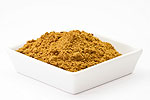 Cumin is a popular spice used in Mexican, Indian, and Middle Eastern cooking. Cumin has a few special powers when it comes to your nutritional health. It can stimulate your digestive enzymes and help you to break down nutrients, so they can be used as fuel and other resources by the rest of your body.
Cumin is a popular spice used in Mexican, Indian, and Middle Eastern cooking. Cumin has a few special powers when it comes to your nutritional health. It can stimulate your digestive enzymes and help you to break down nutrients, so they can be used as fuel and other resources by the rest of your body.
Cumin seeds are a good source of iron. They are thought to exert an anti-tumor effect against cancer. And now researchers have found that cumin seeds may also have a unique ability to keep blood glucose in check.
The Research
For their study, the research team investigated the effect of an extract of cumin seeds on diabetes and oxidative stress. (By the way, cumin has other great health properties. See the article, This Spice is a Great Antioxidant.) They also compared results from the cumin extract and a common diabetes drug, glibenclamide.
Diabetic rats were given either the cumin seed extract or glibenclamide for 28 days. The researchers found that both treatments caused a reduction in blood glucose, creatinine (a waste molecule that can build up in the kidneys) and blood urea nitrogen. Both treatments also improved insulin and glycogen (liver and skeletal muscle) content when compared to diabetic control rats.
When it came to preventing oxidative stress, the cumin seed extract and glibenclamide began to show differences. The cumin seed extract caused a significant reduction in renal oxidative stress compared to the diabetic controls and glibenclamide.
The cumin seed extract also improved antioxidant status in the kidney and pancreas of the diabetic rats. Some other interesting changes in the diabetic rats given the cumin extract occurred. Their collagen levels improved, as did their ability to digest proteins.
The researchers concluded that a cumin seed extract exerts an antidiabetic effect similar to that of glibenclamide, but that it has a better effect in controlling oxidative stress.
